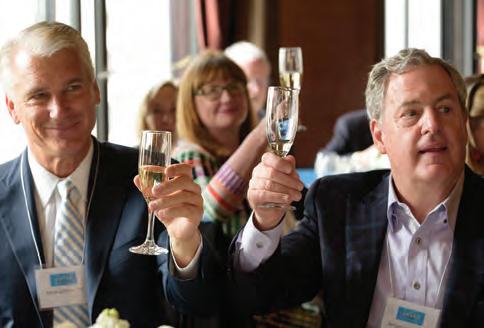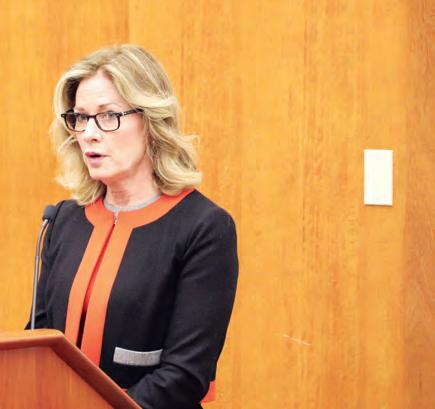
9 minute read
Advancement
Updates from Development & Alumni Relations
Lighting the Way
UC Berkeley’s Light the Way campaign—a comprehensive effort to raise $6 billion by the end of 2023—is ambitious, aspirational, and inspiring.
The recent launch of the campaign’s public phase aims to drive investment in the university’s core strengths: extraordinary community, research for the public good, and spaces for learning, living, and work. It builds on Berkeley’s distinctiveness in transforming lives, fueling social mobility, and changing the world.
“For the law school, this campaign is critical to ensuring that we remain a leader in legal education and able to provide access to students from every economic background,” Dean Erwin Chemerinsky says. “Our top fundraising priorities are student scholarships, faculty excellence, and clinical programs.”
REACHING OUT: The university’s campaign will help recruit and retain top professors like Jonah Gelbach, who joined Berkeley Law last summer.
All gifts made during Light the Way, no matter the size or allocation, count toward its success. Underway since 2014, the campaign has already raised about $3.5 billion for Berkeley, and over $120 million for the law school from more than 8,000 donors.
“Through this effort, we are mobilizing our entire Cal community to stand together, demonstrating our collective power to illuminate knowledge and realize a common vision for our future,” says UC Berkeley Chancellor Carol Christ.
Berkeley Law already has had much to celebrate during the campaign. Its intellectual property and environmental law programs rank No. 1 among U.S. law schools, and it’s among the top eight in criminal law (No. 3), contracts/commercial law (No. 3), business law (No. 4), constitutional law (No. 7), and clinical education (No. 8).
Last year Berkeley Law hired nine new professors, all with first-rate credentials, the best recruitment year of any law school. Chemerinsky notes that this remarkable talent injection would not have been possible without sufficient philanthropic support.
The current 1L class is among the most academically accomplished in school history, having entered with a median 3.81 GPA and a median 168 LSAT score. It has more African Americans (34) than any previous class, and more Native American students are at the school than ever before. The 1L class is 49 percent people of color, and the academic-year LL.M. class hails from 50 nations.
“Support from alumni and friends is essential to achieve our shared vision,” Chemerinsky says. “It brings exceptional students through our doors, positions us to better recruit and retain top faculty who are great teachers and scholars, and enables us to make a real difference on vital legal issues and in the lives of marginalized community members.”
During the campaign, Berkeley Law has made great strides in raising support for financial aid. The class that graduated in May 2019 received $3.6 million in aid per year, while the class that entered in August received almost $6 million.
The inspiring clinical program, a valuable training ground for students, provides prime opportunities for hands-on casework that builds pivotal lawyering skills while serving the disenfranchised. Alumni contributions have helped the school hire additional clinical faculty, expanding the number of projects and their collective impact.
Last summer, Berkeley Law increased the grant to each student doing summer public interest work (250 rising 2Ls and 3Ls) from $4,000 to $5,000. The school has also increased the availability and benefits of its Loan Repayment Assistance Program for graduates working in public interest jobs. More than 90 percent of current students do pro bono work.
“With the sharp decline in state funding of higher education, we rely on alumni support to fortify our excellence, community, and public mission,” Chemerinsky says. “In order to remain competitive with our peer schools, that support is essential. I hope that our alumni will continue to be generous through the course of this campaign.” —Andrew Cohen
— UC Berkeley Chancellor Carol Christ
NETWORKER: Berkeley Law Alumni Association President Karen Boyd ’96 is helping to create alumni communities in graduates’ home cities.
An Extended REACh to Bay Area Alumni

San Francisco and Silicon Valley may not be far from Berkeley, but busy graduates from those areas can rarely just drop in on their alma mater. Enter the law school’s newest Regional Engagement Alumni Chapters (REACh), created by the Development and Alumni Relations Office.
The program aims to help alumni make connections with each other, and the school, in their home cities. It launched in 2018 in Los Angeles, home to Berkeley Law’s third-largest community of graduates.
Berkeley Law Alumni Association President Karen Boyd ’96 says even though her office is fewer than 40 miles from the law school, it can be hard to get to campus for anything smaller than Alumni Reunion Weekend. REACh events mean she doesn’t have to.
“We wanted to be where people are,” she says. “It makes something like a happy hour or a reception much more accessible. We can do things a lot more effectively and actually build that community in a way that’s a lot more connected.”
Why two new chapters? Because it’s not just the geography that’s distinct, notes Boyd, who lives and practices in Silicon Valley.
“We are one population, and it’s different than San Francisco,” she says.
REACh takes the tendency of graduates to gather in their home cities and makes it a formal partnership with the Development and Alumni Relations team. Last fall, Professor Molly Van Houweling visited the San Francisco chapter to talk about building the skills lawyers need to find work-life balance and satisfaction. Professor Peter Menell spoke to a Silicon Valley gathering about the future of intellectual property law.
Additional plans include events targeted at young alumni, happy hours, and periodic visits from Dean Erwin Chemerinsky.
Mary Briese Matheron, the senior assistant dean of Development and Alumni Relations, sees REACh as providing opportunities for networking, intellectual engagement, career development, and, of course, socializing. Another chapter should be up and running later this year in Washington, D.C.
Boyd says expanding networking opportunities with other Berkeley Law alumni this way is especially valuable because REACh programs attract a broad array of professionals.
“These events are pulling people across practice areas, people who are at big firms and small firms, in-house lawyers, public interest advocates, and people who aren’t practicing law,” she says. “That’s really the way to build your network, by making connections outside your area.
“Alumni groups are good for that, and Berkeley Law’s are especially so, because we have so many amazing people out there.” —Gwyneth K. Shaw

ALL RISE: Judges Jon Streeter ’81, Ioana Petrou ’93, Jeremy Fogel, and Trina Thompson ’86 took part in a San Francisco chapter REACh panel event in February.

Celebrating Berkeley’s Best
This year’s Citation Award winners have an inspiring track record of fortifying Berkeley Law’s core pillars of excellence, community, and public mission in numerous ways. The annual Citation Award Luncheon is scheduled for June 11 at The City Club of San Francisco; please check for potential rescheduling updates at www.law.berkeley.edu.

Citation Award: Honors graduates who have made exceptional contributions to the school, the bar, the bench, legal scholarship, the state, the nation, and the world. Recipients: Arthur Shartsis ’71 and Mary Jo Shartsis ’72, partners at Shartsis Friese in San Francisco. Art, the Association of Business Trial Lawyers of Northern California’s founding president, was elected director and president of San Francisco Bay Area Rapid Transit (BART). He also served on the Berkeley Law and UC Berkeley Alumni Association boards and co-chaired the law school’s Centennial. Mary Jo has been named a top-rated business litigation attorney by Super Lawyers every year since 2004. A past Berkeley Law Alumni Association president, she has received multiple awards for her work on behalf of human rights, civil liberties, and individual rights.
Young Alumni Award: Honors a recent graduate (past 15 years) who has made significant community contributions through professional, charitable or other public service activities, extraordinary service to the law school, and other achievements. Recipient: Cara Sandberg ’12, chambers attorney at the Supreme Court of California. Sandberg serves on the Berkeley Law Alumni Association board, and has been a tireless mentor for the school’s women of color, African-American students, and judicial clerkship applicants. The dean of a Bronx high school before law school, she has helped initiate or expand mentoring programs through Berkeley Law’s Women of Color Collective, First Generation Professionals, and California Law Review.
IN APPRECIATION: Mark LeHocky ’79 (left) and Benjamin Riley ’83 toast last year’s Citation Award winners.
Faculty Lifetime Achievement Award: Honors the lifelong contributions and accomplishments of an exemplary Berkeley Law faculty member. Recipient: Christopher Edley Jr., Honorable William H. Orrick Jr. Distinguished Professor. Edley served as Berkeley Law’s dean from 2004 to 2013, after 23 years as a Harvard Law professor. He has moved between academia and public service, having served in high-level White House policy and budget positions under Presidents Jimmy Carter and Bill Clinton. He held senior positions in five presidential campaigns, including senior policy adviser for Barack Obama, and co-chaired the congressionally chartered National Commission on Education Equity and Excellence from 2011 to 2013.
Judge D. Lowell and Barbara Jensen Public Service Award: Honors a prominent graduate who has demonstrated outstanding dedication to public service in the legal profession. Recipient: Hon. Claudia Wilken ’75, senior judge at the U.S. District Court for the Northern District of California. A judge at the court since 1993, Wilken was a magistrate judge there for the preceding 10 years. She also worked in private practice, was a public defender, and taught at Berkeley Law as an adjunct professor. Some of her major decisions include limiting but upholding San Francisco’s domestic partners law, overturning California’s term-limits law, and allowing lawsuits against school officials for ignoring sexual harassment against students.
A Hub for High-Profile Events
Before the coronavirus forced Berkeley Law to cancel its remaining events, every week offered abundant opportunities to see renowned guests share their knowledge and insights at the school. From lunchtime presentations and customized programs to dynamic conferences and symposia, experts from all over flocked to Berkeley to engage with the law school community.

A: Drucilla Ramey, Equal Rights Advocates chair and former National Association of Women Judges executive director
A


B
B: Richard Cordray, former Consumer Financial Protection Bureau director and Ohio Attorney General
H

H: United Kingdom Information Commissioner and Global Privacy Assembly Chair Elizabeth Denham
C: Diana Henriques, award-winning New York Times financial journalist and author
D: Former diplomat Irving Tragen ’45 (right) at the inaugural lecture on comparative law in his name
C


D
E


I

F G


E: Law school deans Mario Barnes ’95 (Washington) and Angela Onwuachi-Willig (Boston University)
F: Burt Neuborne, Brennan Center for Justice founding director and renowned civil liberties lawyer
G: Yale Law Dean Heather Gerken at the second annual Herma Hill Kay Memorial Lecture
I: Best-selling author, speaker, and podcast host Layla Saad









